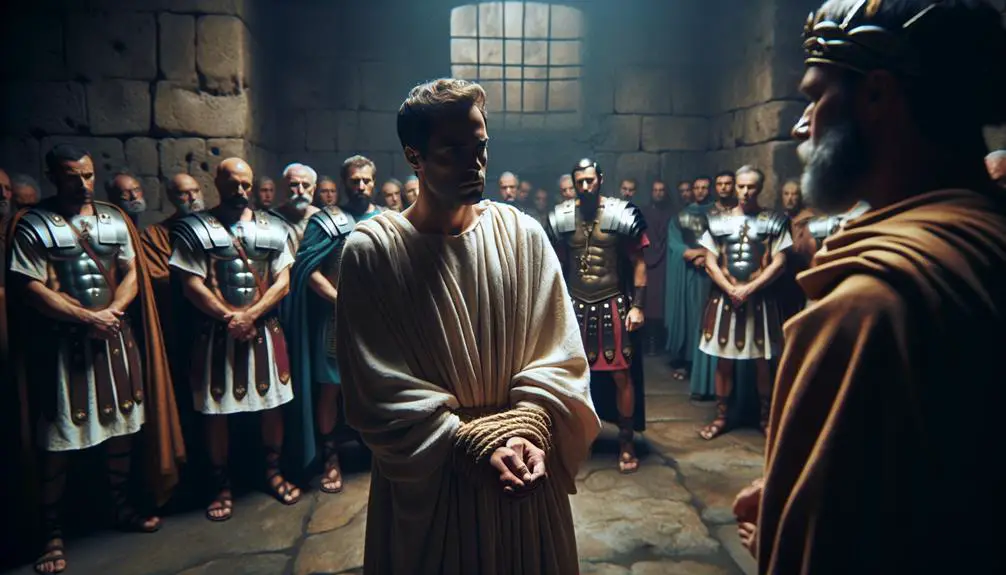Uncover tales of resilience and injustice as false accusations in the Bible reveal timeless lessons on truth, faith, and redemption.

False Accusations in the Bible
Throughout timeless tales, false accusations frequently form the fulcrum of fascinating narratives within the Bible. You'll uncover how characters like Joseph and Daniel faced life-altering challenges due to deceit and dishonest claims. These stories aren't just ancient texts; they're reflections on integrity, resilience, and the quest for justice that resonate deeply today.
As you explore each account, from Joseph's unjust jail time to Stephen's staunch testimony, you'll find yourself questioning the nature of truth and the strength of faith in the face of adversity. Let's embark on this journey together, where the past's echoes may just illuminate the complexities of our present.
Key Takeaways
- False accusations often stem from envy, political motives, or manipulation of strengths.
- Divine protection and justice are central themes in overcoming false accusations.
- Integrity and faithfulness are crucial for navigating and overcoming challenges.
- Covetousness and manipulation lead to societal injustice and erosion of trust.
Joseph and Potiphar's Wife

In the biblical account, Joseph, serving in Potiphar's household, faces unjust accusations from Potiphar's wife, marking a pivotal moment of false accusation and its consequences. This narrative not only highlights Joseph's integrity but also underscores the complexities of social dynamics within a power-laden environment. As you delve deeper, you'll see that Joseph's ability to interpret dreams, initially a means to elevate his status, becomes secondary to the more pressing issue of navigating the treacherous waters of social hierarchy and personal vendettas.
Joseph's predicament is emblematic of the precarious position of the foreigner or the outsider, who, despite possessing exceptional talents like dream interpretation, remains vulnerable to the whims of those more socially and politically powerful. The false accusation by Potiphar's wife isn't just an attack on Joseph's character but a manipulation of social dynamics, leveraging her status to victimize Joseph.
This episode serves as a critical reflection on the consequences of false accusations, especially within a context where an individual's word holds significant weight. It's a reminder of the inherent dangers in a system where the balance of power is skewed, and the truth can be easily overshadowed by personal biases or motivations.
Moreover, the story illuminates the broader theme of resilience and faith in the face of injustice. Joseph's journey, punctuated by dream interpretation and navigating complex social dynamics, ultimately leads to a profound exploration of character, faith, and the human condition, offering timeless insights into the handling of false accusations and the pursuit of justice and integrity.
Daniel in the Lion's Den

Transitioning from the tale of Joseph to the narrative of Daniel in the Lion's Den, you'll find similar themes of false accusations, divine protection, and unwavering personal integrity.
In this story, Daniel's adversaries unjustly accuse him, leading to a death sentence that tests both his faith and the protective hand of his God.
Analyzing these points reveals the enduring message about the power of faith and integrity in the face of deceit and persecution.
Accusations Against Daniel
Daniel's adversaries cunningly orchestrated false accusations against him, leading to his infamous ordeal in the lion's den. You must understand, these accusations weren't rooted in genuine misconduct but in envy and political maneuvering.
Daniel's exceptional skill in dream interpretation and his unwavering adherence to his faith placed him in a vulnerable position. His rivals, aware of his devout practices, manipulated royal edicts to their advantage. They convinced the king to enact a law that, unbeknownst to him, would directly conflict with Daniel's religious obligations.
This strategic manipulation highlights a critical aspect of false accusations: they often exploit the victim's strengths and principles. Such tactics ensure that the accusations, though baseless, create a dilemma that seems to validate the charges, cleverly obscuring their deceitful origins.
God's Protection Demonstrated
Despite the cunningly orchestrated accusations against him, Daniel's faith led to a remarkable demonstration of God's protection when he emerged unscathed from the lion's den. This event not only highlights the moral resilience of Daniel in the face of unjust allegations but also serves as a powerful testament to divine justice.
The narrative meticulously underscores how moral integrity, when coupled with unwavering faith, activates divine intervention in seemingly hopeless circumstances. Furthermore, the deliverance of Daniel without a single scratch despite being thrown into a den of lions underscores a profound message: divine justice prevails over human malice.
This episode in the biblical text encourages readers to reflect on the strength of moral resilience and the certainty of divine justice in the face of false accusations.
Daniel's Faithful Integrity
In the narrative of Daniel in the Lion's Den, his unwavering integrity amidst false accusations is a cornerstone, showcasing a profound lesson in maintaining faith and moral uprightness under dire circumstances. Daniel's wisdom and his ability to navigate Babylonian culture with fidelity to his beliefs, even when faced with death, are pivotal. His story is not merely about survival but about thriving through adherence to principle.
Aspect |
Details |
|---|---|
Accusation |
Daniel's adherence to his faith led to jealousy and a contrived accusation by his peers. |
Response |
Despite knowing the consequences, Daniel continued his practice of prayer, demonstrating steadfast faith. |
Outcome |
Daniel's integrity was vindicated; his accusers faced the consequences of their deception, highlighting moral fortitude's triumph. |
This episode emphasizes the potency of truth and the resilience of the human spirit when guided by unwavering ethical principles.
Naboth's Vineyard Plot

You'll find that Naboth's vineyard plot exemplifies a critical instance of false accusation within the biblical narrative. This story not only highlights King Ahab's intense desire to possess Naboth's land but also demonstrates the profound implications of Naboth's wrongful accusation by Jezebel's scheming.
Moreover, Elijah's intervention underscores the theme of divine justice, providing a counterpoint to human injustice.
Naboth's False Accusation
Naboth's Vineyard plot exemplifies a disturbing instance of false accusation, where Naboth faced unfounded charges that led to his demise. This narrative not only highlights the gravity of bearing false witness but also underscores its legal implications and social consequences.
- Legal implications: Naboth's case reveals how judicial systems can be manipulated, leading to wrongful punishment.
- Social consequences: The community's trust erodes when justice is subverted, showcasing a breakdown in societal values.
- Moral integrity: Challenges our understanding of truth and integrity within a community setting.
- Divine justice: Suggests a broader, spiritual perspective on justice and retribution.
Analyzing this event, we're reminded of the profound effects false accusations have on individuals and communities, urging a reflection on the values of justice and truth.
Ahab's Covetous Desire
King Ahab's intense longing for Naboth's vineyard drives the narrative forward, revealing the destructive power of covetousness at the heart of this biblical story. This account not only highlights royal jealousy but also underscores a profound lesson on property greed. Ahab's covetous desire transcends a simple wish; it embodies a deeper, moral failing that poisons his judgment and actions.
This royal jealousy, stemming from Ahab's inability to possess Naboth's vineyard, escalates into a darker plot fueled by deceit and manipulation. The story meticulously dissects the lengths to which Ahab is willing to go, driven by his insatiable property greed. This narrative serves as a critical reflection on the dangers of allowing covetous desires to override ethical principles and the catastrophic consequences that can ensue.
Elijah's Divine Intervention
In the unfolding drama of Naboth's vineyard, divine intervention through the prophet Elijah becomes a pivotal moment, challenging the corrupt actions of Ahab with a stern message from God. Elijah's return marks a dramatic shift, bringing divine justice into the narrative. His prophetic challenges not only expose the wrongdoing but also set a course for accountability.
Key aspects of Elijah's divine intervention include:
- Elijah's return to confront Ahab directly, embodying divine authority.
- Prophetic challenges that unveil the moral and spiritual failings of Ahab's reign.
- The delivery of divine judgment, serving as a reminder of God's omnipresence and justice.
- The role of prophecy in upholding justice and morality within the community.
This episode underscores the power of divine intervention in addressing and rectifying human injustices.
Susanna's Trial

Susanna's trial, as detailed in the Book of Daniel, showcases a pivotal moment where false accusations lead to a profound test of faith and justice. At the heart of this narrative, Susanna's innocence stands as a beacon of integrity amidst a society governed by cultural norms that heavily favor the male perspective, especially in legal matters. The story unfolds as Susanna, a virtuous and married woman, is falsely accused of adultery by two elders who'd attempted to coerce her into a sexual liaison. When she refuses their advances, they retaliate by leveraging their societal status to malign her character.
This episode illuminates the complexities of navigating truth and falsehood within a system predisposed to side with those of higher social standing. It's a critical examination of how cultural norms can distort the course of justice, particularly against the vulnerable or those unable to defend themselves effectively in a biased environment. Susanna's ordeal underlines the stark contrast between the corrupt application of law by the elders and the divine wisdom that eventually exonerates her through the intervention of the young prophet Daniel.
Analyzing Susanna's trial through an objective lens, it becomes evident that her story isn't just a tale of personal vindication but a broader commentary on the need for justice systems to evolve beyond the prejudices of cultural norms. It underscores the importance of impartiality and the courage to challenge entrenched injustices, highlighting how truth ultimately prevails through righteous advocacy and divine insight. Susanna's narrative, therefore, isn't only a testament to her unwavering faith and innocence but also a call for a more equitable and just society.
Jesus Before Pilate

Reflecting on Susanna's ordeal and the distorting effects of societal biases in justice, we encounter another profound example of false accusation in the trial of Jesus before Pilate. This event underscores the complexities surrounding the use of power, the manipulation of facts, and the ethical dilemmas faced by those in authority.
Pilate's interaction with Jesus and the Jewish leaders presents a multifaceted study of legal and moral quandaries. Pilate's dilemma wasn't just a matter of discerning guilt or innocence but was also heavily influenced by political expediency and public pressure. The Jewish leaders, determined to see Jesus condemned, presented charges that they believed would compel Pilate to act.
Consider these key points:
- Pilate's Dilemma: Caught between his understanding of justice and the demands of the Jewish leaders, Pilate faced a profound ethical and political challenge.
- Manipulation by Jewish Leaders: They skillfully presented their case against Jesus, aiming to sway Pilate by framing Jesus as a threat to Roman authority.
- Question of Guilt: Despite finding no basis for a charge against Jesus, Pilate was pressured into making a decision that would satisfy the crowd and maintain peace.
- The Use of Power: The trial highlights the dangerous interplay between political power, justice, and public opinion.
This scenario reveals the intricate dynamics at play when power, justice, and truth collide. The trial of Jesus before Pilate, marked by false accusations and societal pressures, serves as a critical examination of the challenges inherent in administering justice fairly and ethically.
Stephen's Testimony

Turning our attention to Stephen's testimony, we delve into another instance where the interplay of truth and justice is starkly challenged by false accusations. In this narrative, the Sanhedrin's role is pivotal. As the highest court of justice and the supreme council in ancient Jerusalem, its influence and power were profound. Yet, this body, meant to uphold justice, becomes the arena for false accusations against Stephen, leading to his infamous stoning.
Stephen's address to the Sanhedrin encapsulates a fervent defense of his faith and an indictment of Israel's historical disobedience. Despite the authenticity and passion in his speech, he faces accusations of blasphemy against Moses and God, primarily based on his preaching about Jesus Christ and the temple's destruction. These accusations, while unfounded, highlight the tension between emerging Christian beliefs and traditional Jewish teachings.
In this context, Saul's conversion emerges as a significant turning point. Witnessing Stephen's martyrdom, Saul, who later becomes Paul the Apostle, undergoes a profound transformation. Initially a persecutor of Christians, Saul's conversion not only marks a pivotal moment in Christian history but also underscores the irony of false accusations leading to truth's revelation and the spread of Christianity.
Analyzing Stephen's testimony and the events surrounding it illuminates the complexities of truth, justice, and faith. The Sanhedrin's role in perpetuating false accusations against Stephen, coupled with the consequential event of Saul's conversion, offers a compelling study of how perceived truths can be manipulated, yet ultimately serve to unveil greater truths within the tapestry of biblical narratives and the early Christian church's development.
Frequently Asked Questions
How Have False Accusations in the Bible Influenced Modern Legal Systems Regarding the Presumption of Innocence?
You'll find that historical narratives of false accusations have shaped modern legal systems' emphasis on trial ethics and scrutinizing accuser motivations.
This directly influences the presumption of innocence, a fundamental principle ensuring that one is considered innocent until proven guilty.
Are There Psychological Studies on the Impact of False Accusations Based on the Narratives Presented in the Bible?
You're exploring the shadows cast by false accusations, seeking to understand their psychological impact.
While not directly linked to biblical narratives, studies delve into victim behavior and accuser motivations, offering a lens to view these ancient stories anew.
Analyzing such research provides a scholarly, objective perspective on the psychological aftermath of false allegations.
These studies illuminate the complex dynamics at play, enriching our understanding of both historical and contemporary implications of false accusations.
How Do Different Religious Denominations Interpret the Moral Lessons From These Stories of False Accusations?
When exploring moral lessons within religious narratives, you'll find that different denominations focus on varied aspects. For instance, the story highlighting Joseph's integrity despite Potiphar's wife's false accusations is interpreted in multiple ways.
Some see it as a testament to unwavering faith and moral fortitude, while others view it as an example of the complexities and consequences of false allegations. Each interpretation aims to offer guidance on navigating ethical dilemmas and maintaining personal integrity.
In What Ways Have These Biblical Stories of False Accusations Been Represented in Art and Literature Throughout History?
Throughout history, biblical stories have been depicted in diverse ways in art and literature, capturing the complexity of human emotions. Painting techniques have evolved, enabling artists to portray dramatic interpretations with profound depth.
These narratives, rich in moral and ethical quandaries, have been reimagined across centuries, offering fresh perspectives on timeless themes. Scholars analyze these adaptations, studying how visual and written mediums reflect and refract societal values and beliefs through the lens of these ancient tales.
What Are the Parallels Between the False Accusations in the Bible and Similar Narratives in Other Religious or Mythological Texts?
You'll find that narratives of false accusations aren't unique to one tradition; they span across various cultures and beliefs. Through comparative mythology, you can uncover striking similarities in how these stories are told, reflecting deep-seated cultural symbolism.
They often serve to communicate moral lessons or explain societal norms. By analyzing these parallels, you gain insight into the universal human experience, showing how different societies tackle the concept of justice and truth.
Conclusion
In conclusion, these biblical narratives of false accusations showcase the resilience and faith of the wrongfully accused, much like a lighthouse stands unyielded against tempestuous waves.
Analyzing these stories reveals a deeper understanding of justice, integrity, and divine providence. Each account, from Joseph's undeserved imprisonment to Jesus' unjust trial, serves as a testament to the enduring strength of truth in the face of falsehood, illuminating the complexities of human nature and divine intervention.



Sign up